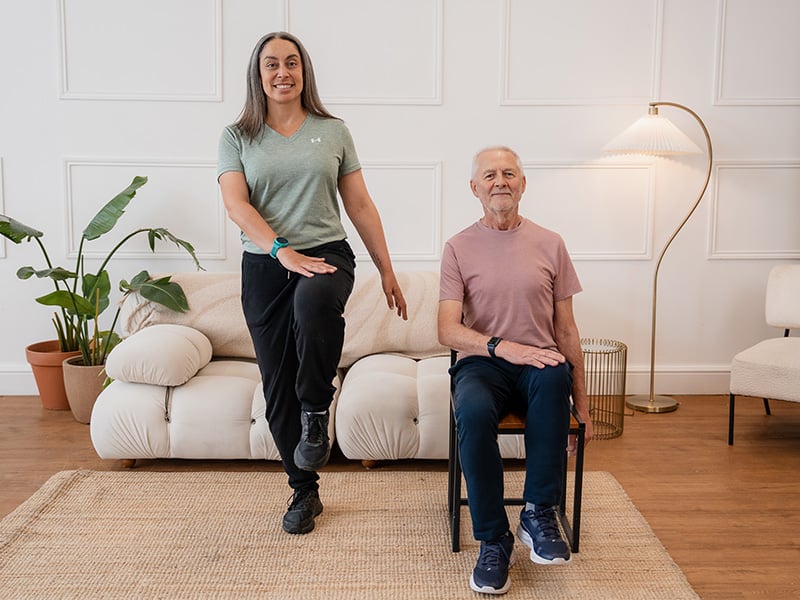Why is exercise good for heart failure?
Heart failure can leave you feeling breathless and tired – even exhausted.
So, if you have heart failure, deliberately making yourself a little more breathless and tired through exercise can be scary.
In the past, people with heart failure were told they needed rest. But we now know keeping active can help to improve your symptoms and quality of life.
If you keep your body moving, you’ll help your muscles and lungs work better, which in turn puts less strain on your heart.
Exercise can also boost your mood and energy levels and make it easier to do things in your daily life.
Even people who are really bothered by their heart failure symptoms may see some small improvements when they start regularly exercising.
Can heart failure be reversed with exercise?
While staying active is linked to a lower risk of developing cardiovascular diseases such as heart failure, the condition cannot be cured and it’s not reversible with exercise.
However, physical activity can still improve your health even if you already have heart problems.
Research shows that exercising when you have heart failure can lead to a reduced risk of being hospitalised.
How can you exercise safely with heart failure?
If you have heart failure, speak to your doctor first. You may need to start exercising while being supervised in a cardiac rehabilitation class.
Cardiac rehab is a personalised exercise and support programme that’s offered on the NHS to people with heart failure.
You may attend a cardiac rehab exercise session in person, follow an exercise programme at home, or a mixture of both.
Ask your doctor or specialist if cardiac rehab is an option for you, and if not, make sure you talk to them before starting any new activity.
What are the best exercises for heart failure?
1. Aerobic exercises – moderate intensity
This type of exercise is where you move most of your body to increase your heart and breathing rate, so you are out of breath but can still hold a conversation.
This includes brisk walking, cycling, moving to music, or following gentle workout videos at home.
2. Strength workouts
This is when you exercise with light weights or resistance bands to help you build muscle strength.
If you’re exercising at home and do not have any weights, you can use unopened food cans or water bottles.
Some activities, like light gardening, offer a combination of aerobic and resistance types of exercise. And if you find standing too tiring, try our chair-based exercises, which are available as a follow-along video.
If you’re thinking of trying a new form of exercise, make sure you discuss it with your healthcare team first.
Which exercises should you avoid with heart failure?
It's important to avoid exercise that involves:
- lifting heavy weights
- holding your breath
- using your whole body as a weight, such as press-ups or planks.
And be careful if you’re getting in the pool, as you can work a lot harder when you’re swimming than you realise.
5 tips for exercising with heart failure
1. Find the right intensity
When you’re exercising, do not overexert yourself. Instead, try to stick to a ‘moderate intensity’. This means that you’ll feel a bit warmer and breathe a bit more heavily, but you should still be able to talk.
2. Warm up and cool down
Warming up before you start exercising can gradually increase your heart rate and get your body ready for exercise.
And a slow cool-down will allow your heart rate to slowly come back down again.
Do not lie down straight after exercise. If you’ve exercised standing up, try some stretches. Or, if you’ve exercised sitting down, do some gentle toe tapping.
3. Try exercising little and often
The UK Government’s guidelines recommend at least 150 minutes of moderate intensity physical activity a week.
You can spread this out by adding a few 5 to 10 minute sessions over the course of each day. Some activity is always better than none. Think about what works for you and your condition.
4. Listen to your body
You may find you have good and bad days with your symptoms. Listen to your body if you need more of a rest that day.
Equally, do not fall into the trap of doing too much if you’re having a good day, as you might wipe yourself out for the next few days.
5. Find a time of day that works best for you
You may find your energy levels vary throughout the day, so try to exercise when you have more energy.
For example, some people find getting ready for the day takes a lot out of them and need to rest a bit before exercising, while others feel more tired later in the day.
When should you not exercise with heart failure?
Stop exercising if you experience:
If you run out of energy, you may need to stop too. In general, you should not exercise on days that you’re unwell or feel more tired or breathless than normal.
And if you’re finding light activities increasingly more difficult, speak to your healthcare team.
What to read next...










